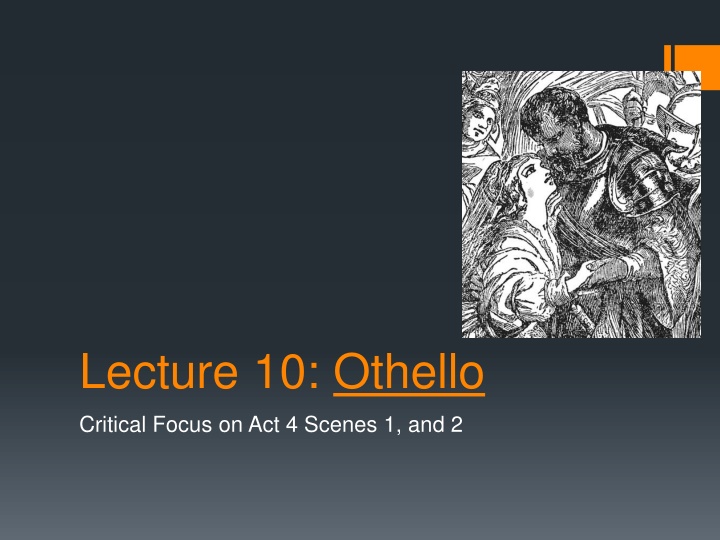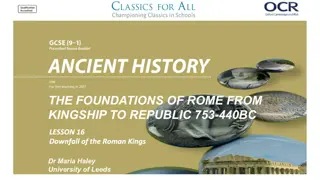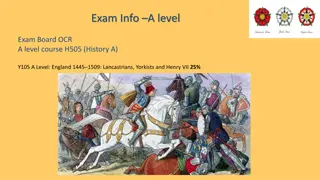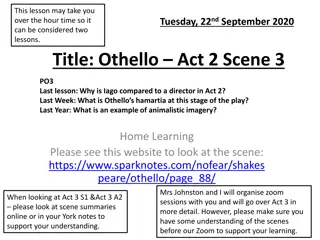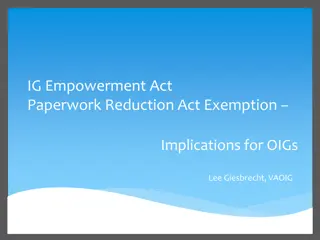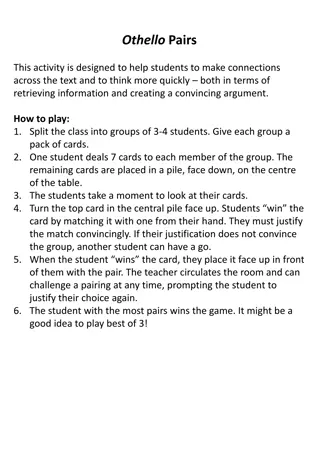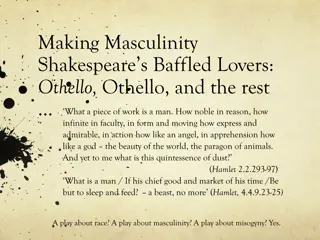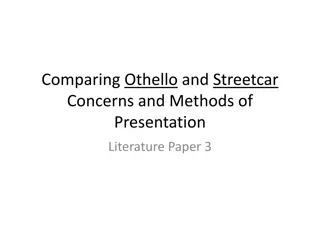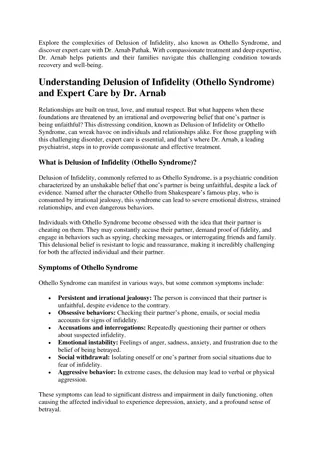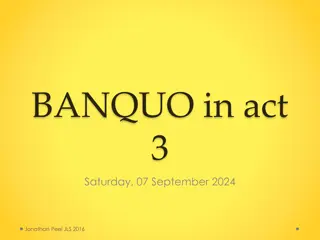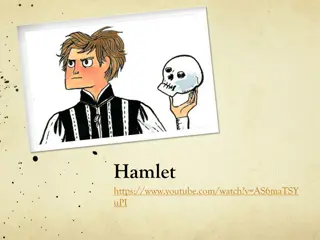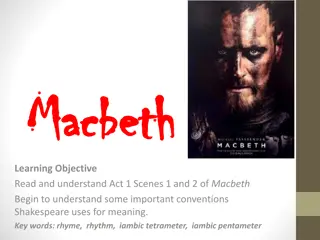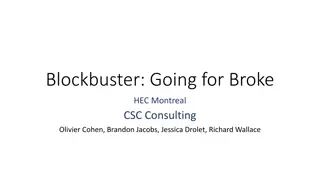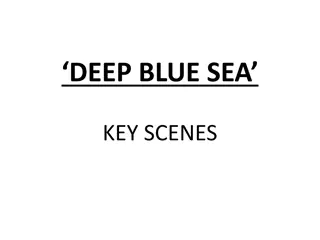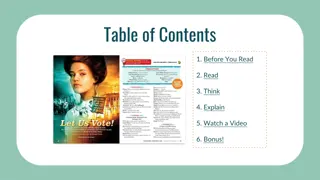Analysis of Othello's Downfall in Act 4 Scenes 1 and 2
In Act 4 Scene 1 of Othello, Iago manipulates Othello into believing in Desdemona's infidelity, intensifying Othello's jealousy and rage. The scene culminates in Othello publicly striking Desdemona, showcasing the depths of his descent into corruption. Meanwhile, Act 4 Scene 2 portrays Othello's complete corruption as he confronts the supposed affair between Cassio and Desdemona. Dramatic irony unfolds as Othello misinterprets conversations orchestrated by Iago, leading to a tragic breakdown in trust. The arrival of Lodovico further exposes Othello's transformation and sets the stage for his downfall.
Download Presentation

Please find below an Image/Link to download the presentation.
The content on the website is provided AS IS for your information and personal use only. It may not be sold, licensed, or shared on other websites without obtaining consent from the author.If you encounter any issues during the download, it is possible that the publisher has removed the file from their server.
You are allowed to download the files provided on this website for personal or commercial use, subject to the condition that they are used lawfully. All files are the property of their respective owners.
The content on the website is provided AS IS for your information and personal use only. It may not be sold, licensed, or shared on other websites without obtaining consent from the author.
E N D
Presentation Transcript
Lecture 10: Othello Critical Focus on Act 4 Scenes 1, and 2
Lecture Focus Act 4 Scene 1: a) Presenting Othello as a figure of pity and sympathy b) Debate between Fate/ Determinism and Choice/ Free Will c) To show the depths of jealousy and violence to which Othello has descended Act 4 Scene 2: d) The complete corruption of Othello
Act 4 Sc 1: Plot summary of this scene Opening of this scene shows Iago working Othello up to a further peak of jealous rage Begins with suggestions of an illicit love affair between Cassio and Desdemona Then comes Cassio s confession of his conquest of Desdemona Another of Iago s fabrications (like Cassio s dream in Act 3 Scene 3, p141) Iago supplies sufficient details engineered to cause Othello to collapse into incoherence
Plot summary cont (note symbolic significance of this conversation) Upon Othello s recovery Iago has a further daring scheme ready, intended to finally satisfy Othello that Cassio and Desdemona really are lovers Othello is to stand by, unseen, while Iago engages Cassio in conversation Note: Othello can see Cassio s gestures but he cannot hear exactly what is being said
Plot summary cont (note symbolic significance of this conversation) Othello therefore misinterprets the conversation, as Iago intends him to do Othello comes to believe that Iago and Cassio are discussing Desdemona But they are in fact talking about Bianca in grossly unflattering terms Dramatic Effect? How all this appears to Othello works him up into an anguished rage Definite dramatic irony
Plot summary cont Lodovico, a kinsman of Brabantio, arrives from Venice, bringing news that Othello is to be recalled from Cyprus And that Cassio is to replace him as Governor Desdemona recounts to Lodovico what has happened between Cassio & Othello And innocently mentions the love she has for Cassio At which point Othello strikes her publicly; Lodovico recalls the noble Moor of earlier days And laments the transformation he witnesses in him And turns to Iago (of all people) for an explanation
Dramatic purpose of Act 4 Scene 1 To win pity and sympathy for the hero To show the depths of jealousy and violence to which Othello has descended To highlight the outrage upon Desdemona To highlight Iago s malice
Note Symbolism of Light and Darkness Acts 1, 2, and 5 are set in the darkness of the night Acts 3 and 4 are set in broad daylight Note: In the scenes of Act 3 and Act 4, Iago s deceptions take place. Symbolically suggests that Othello is unable to see through matters clearly Dramatic Effect: This intensifies the irony
Lecture Focus Act 4 Sc 1: a) Presenting Othello as a figure of pity and sympathy b) Debate between Fate/ Determinism and Choice/ Free Will c) To show the depths of jealousy and violence to which Othello has descended Act 4 Sc 2: d) The complete corruption of Othello
How does the idea of not being able to see despite the light win our sympathy and pity for Othello? We have seen Othello grow in jealousy in the belief that his wife is guilty of adultery. Act 4 Scene 1 begins with the entry of Othello and Iago in the middle of a conversation [Recall Scene 1 of Act 1] Dramatic technique: As a stage device to concentrate attention upon crucial dialogue in a realistic way
Iagos malice continues From the first uneasiness at Iago s hints to the savage insistence on the handkerchief But the growth has not been steady Othello has had moments of return to near sanity And until the end there will be other moments when he remembers the purity and love which Desdemona once represented to him. Dramatic Effect? Builds suspense through to Act 5
The reason why Othello looks but cannot see For this cause when the heart is wounded with griefe by any one, it desireth to returne the like to him that hurt it, and to rebite him of whom it is bitten. This affection is a desire of revenge, which being him that hath offended us to suffer that punishment, which in our judgement he hath deserved Every offence therefore that ingendreth hatred, anger, envy or indignation bringeth with it a desire of revenge, which is to render evill for evill, and to requite griefe received with the like againe. (The French Academie, 1594)
The reason why Othello looks but cannot see La Jalousie is a 1957 novel by Alain Robbe-Grillet. The title of its English editions is Jealousy, but this fails to capture the ambiguity of the French title: "la jalousie" can be translated as "jealousy", but also as "the jalousie window". And the jealous husband in the novel spies on his wife through the Venetian blind-like slats of the jalousie windows of their home.
The reason why Othello looks but cannot see Othello is not allowed to forget, but is continually fed with Iago s observations and suspicions so much so that it becomes impossible to distinguish moments that are observed from those that are merely suspected. Jealousy = jalousie = blind-like slates that cover windows
Dramatic effect?? Theatrical effect?? Pity and sympathy for Othello Othello is undergoing the most horrible torture. Of what kind? Form? Mental torture; psychological
Tragic Hero? INSECURITY His regard for opinions of others of him as proof and corroboration of his own sense of his worth Far less secure and stoutly-timber d in his private feelings than in his professional identity PRIDE (Hubris) His obsession with reputation and being an honourable, ideal and valiant soldier Not I; I must be found. My parts, my title, and my perfect soul Shall manifest me rightly. (I, ii, 30-32)
Tragic flaw INSECURITY + PRIDE made manifest in the jealousy he feels towards Cassio & the need to be assured of Desdemona s devotion In stripping off his illusions of himself, he gives himself over to cruelty And let her rot, and perish, and be damned to- night I will chop her into messes! (IV, i, 178- 97) Is he, therefore, culpable of bringing about his own downfall?
The Berenstain Bears and the Green-Eyed Monster (First Time Books(R)) Overview Nonso%2520Anozie%2520-%2520Othello%2520Photo%2520by%2520Keith%2520Pattison Valour Reputation Eloquence Insecurity Pride
Lecture Focus Act 4 Scene 1: a) Presenting Othello as a figure of pity and sympathy b) Debate between Fate/ Determinism and Choice/ Free Will c) To show the depths of jealousy and violence to which Othello has descended Act 4 Scene 2: d) The complete corruption of Othello
The Individual, humanity and society Shakespeare shows how a marginalized individual like the Moor, Othello, comes to believe he is somewhat less than human And in striving to embody the dominant notion of humanity in Venetian society He comes to lose his way in the world Despite initially seeming different from other Moors, Othello ultimately fits the stereotype of Moorish lust and violence
Are you a man? Othello becomes a jealous, murderous husband of a Christian high society lady, the daughter of a senator no less; Is Othello returning to his essential nature? Is he hard-wired, fated and hence predestined to play out the script of wife-murderer? Or asked in more modern terms Is he genetically programmed as a man, or as a Moor? Iago asks him, Are you a man?
Fate or Choice? Determinism or Free Will? That he has achieved much in military affairs That essentially he is of noble character And so? Any big BUTS ? But he has allowed himself to be debased by a humiliating passion; How much debased? To a level not far above that of the animal In fearing for him, we also even fear for ourselves. Do you know why this may be so?
Fate or Choice? Determinism or Free Will? Being a tragedy, it is meant to involve us And excite emotions of fear and pity [Effects] Othello seems to suffer for the virtues he has: His nobility of mind Defect? Too self-centred? With his jealousy aroused, do you not think he dwells too long on his own lost pride? Thus excluding other considerations such as? The possibility of his wife s innocence.
Fate or Choice? Determinism or Free Will? Othello has a choice? The choice of believing in Desdemona s innocence, but Iago ? Thus for Othello, is choice therefore impossible? Could we then say therein lies the essence of this tragedy?
Fate or Choice? Determinism or Free Will? Note Othello s preparedness to faithfully follow all Iago s instructions To become an eavesdropper Critical thinking question: Does he come across as a tragic figure? We see him hide, crane his neck, and strain his ear to listen to talk between Iago and Cassio
Determinism or free will that moves him towards his end? Critical significance of his dramatic actions? Recall Othello was so frank, open and honest in all his dealings with Brabantio in Act 1? But Othello is now prepared to be most cunning in my patience [L-91] so that he can hear all. Emerging from his hiding place with one thought? How shall I murder him, Iago? L-167 I would have him nine years a-killing L-175
Lecture Focus Act 4 Scene 1: a) Presenting Othello as a figure of pity and sympathy b) Debate between Fate/ Determinism and Choice/ Free Will c) To show the depths of jealousy and violence to which Othello has descended Act 4 Scene 2: d) The complete corruption of Othello
In what state is his heart now? Turned to stone, convinced of Desdemona s unfaithfulness When shall her murder take place? At once: let her rot and perish, and be damned tonight, for she shall not live L178- 179 Othello at this point is out of his mind with these torturous thoughts He is now so corrupt and debased in mind, descends to accept Iago s plan Iago: Do it not with poison, strangle her in her bed, even the/ bed she hath contaminated L204-205, p181 Sees himself as Justice. (dramatic irony) the justice of it pleases, very good. Reason Emotion
Symbolical significance of the slap? By calling her devil O devil, devil!/ If that the earth could teem with woman s tears,/ Each drop she falls would prove a crocodile./ Out of my sight! Discuss what is Othello s opinion towards Desdemona?
Dramatic Effects Othello is in the labyrinth of the monster Iago And now, he has become similar to the demi-devil who ensnared him Othello s degradation, his debasement is complete The audience s sense of pity for Othello deepens
Lecture Focus Act 4 Scene 1: a) Presenting Othello as a figure of pity and sympathy b) Debate between Fate/ Determinism and Choice/ Free Will c) To show the depths of jealousy and violence to which Othello has descended Act 4 Scene 2: d) The complete corruption of Othello
Act 4 scene 2 a room in the castle The Brothel Scene To introduce the Brothel Scene; (So called because Othello questions Emilia as though she were the keeper of a brothel) To accentuate the nobility of Desdemona To link up the machinery of the plot [this scene functions to tie up loose ends of the plot thus far] To prepare the audience for the downfall of Iago To show the progress of Othello s degradation To show Othello is more anxious to obtain evidence of Desdemona s guilt than her innocence To highlight the character and function of Emilia
Othellos ideas and language (Entry point through language) This scene marks an even more extreme stage in the degradation of Othello who is by now thoroughly corrupted His corruption is underlined by his use of ideas and language previously characteristic of Iago (note the language of corruption) Othello has taken over Iago s role as he blackensDesdemona s character
Desdemona perceived as a prostitute Othello treats Desdemona as a harlot; She cannot comprehend the reason for his attitude or his anger Then Othello indulges in self-dramatization and self-pity seeing himself as the very pattern of the betrayed husband;
Diction: repetition of the word whore the language of corruption Emilia: the purest of their wives. Othello: This is a subtle whore. Are you not a strumpet? Was this fair paper, this most goodly book Made to write whore upon? Damn thyself; false as hell Impudent strumpet
Cold Irony It is this monstrous fact which In this last full conversation with his wife before her murder in Act 5 That finally drives Othello from heart-break, through disgust and anger, to the cold irony when he declares I cry you mercy then. / I took you for that cunning whore of Venice / That married Othello.
Recall Iago on Reputation 3.3 Good name in man and woman, dear my lord, Is the immediate jewel of their souls, Who steals my purse, steals trash; tis something, nothing; Twasmine, tis his, and has been slave to thousands; But he that filches from me my good name Robs me of that which not enriches him, And makes me poor indeed. .
Desdemona about Othello in 3.4 Noble Moor; and Base Moor Believe me, I had rather have lost my purse Full of crusadoes. And, but my noble Moor Is true of mind, and made of no such baseness As jealous creatures are, it were enough To put him to ill-thinking. p147
Desdemona (earlier and now) Making cross connections Roderigo (to Brabantio, about Desdemona) in 1.1.132-136 p11 Your daughter, if you have not given her leave, I say again, hath made a gross revolt, Tying her duty, beauty, wit, and fortunes In an extravagant and wheeling stranger Of here and everywhere. The Individual in conflict with Society
Emilias critical question Hath she forsook so many noble matches, Her father, and his country, all her friends, To be called whore? Would it not make one weep? [Issues related to the Individual and Society- Note the use of enumeration counting what Desdemona lost in contrast to what she gains. Imagery of the tipping scales?] Those who exert their free wills would ultimately be crushed by society, because it is not ready for such people? What is Emilia s opinion of Desdemona here? Pities her mistress, could have made a more deserving match and lead a better life than now.
Parallelism Desdemona is reduced to a pitiful wreck through the vile abuse of her character by the only person she really and deeply loves (We recall) in the previous scene, [4.1] Iago has enjoyed his cruel triumph over a helpless, suffering Othello In this scene Othello enjoys a similar triumph over a helpless Desdemona Both episodes dramatically parallel each other, to what dramatic effect? Deep sense of tragedy? Pay misery forward and make everyone unhappy?
Parallelism (making connections) Desdemona pleads with Iago to help her to win back her husband s love But she is met only with the same cold merciless response (line 131, p195) as greeted Othello when he cried out for understanding from Iago (A3S3 lines 448,450, p143) Her kneeling to heaven at this point to confess her fidelity parallelsOthello s similar action in Act 3, Scene 3 when his motive was to seek divine sanction for his revenge
Irony of this scene oft times intense Of all people, Desdemona turns to Iago for assistance. (Implications?) For help to win back Othello s love Bitter irony Iago enters to observe the suffering Desdemona I know not how I lost him. Here I knee
Emilia stumbles on the truth of Othello s bitterness Emilia is now convinced that Othello s jealousy has been inspired by some self-seeking knave some eternal villain / Some busy and insinuating rogue has abused Othello with foul slander of Desdemona pg 197 What is the dramatic irony? The rogue in dramatic ironical terms stands beside her in the form of her husband.
Cruel epithets, foul imagery Recall the noteworthy choice of imagery of foul toads (line 60, p191) o, ay, as summer s flies and o thou weed that accompanies Othello s words (p191) The scene in powerful dramatic terms shows the depth of Othello s downward spiral into degradation
Change; Transformation Emilia: Here s a change indeed. [p193] Recall the words of Iago at the end of 1.3 It is engendered. Hell and night/ Must bring this monstrous birth to the world s light. Othello is in Iago s complete control. (cr p185 and 139)
The wisdom of the prudent is to give thought to their ways, But the folly of fools is deception. Proverbs 14:8
